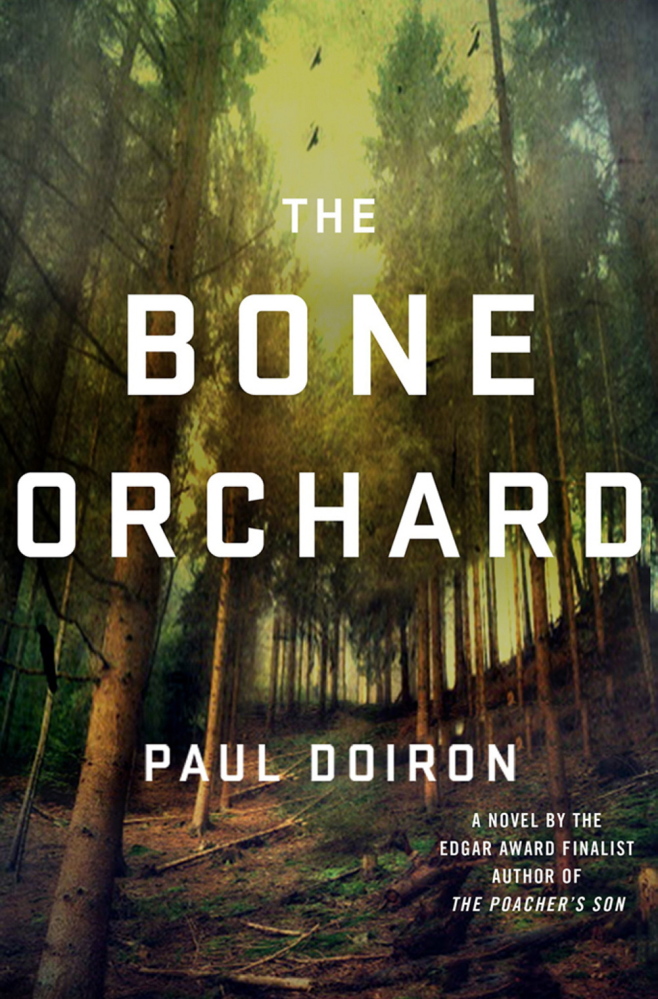“The Bone Orchard” introduces fans of Maine author Paul Doiron to a new Mike Bowditch. Here is a markedly different man from the impulsive, often reckless and difficult to manage Maine Warden Service officer portrayed in the previous four Doiron mysteries that featured Bowditch, as he was constantly reassigned to new districts for insubordination.
In the last installment, “Massacre Pond,” Bowditch left the service after his life fell apart. Now, he is working as an independent fishing guide for hire. He’s scruffy with a beard and lacking much of his old fire and impetuousness.
The book’s opening introduces us to something of a different Doiron as story crafter, as well, one that interestingly mirrors Bowditch’s emotional remove. The first chapter does not open in situ – in the midst of some dramatic moment. Instead, Bowditch dispassionately reflects on an old friend, Jimmy Gammon, an affable but socially inept kid from a family of wealth and power. Gammon went into the military and was utterly transformed during his Afghanistan tour, becoming jaded and hardened. He returned home horribly disfigured by an explosion that left him with only one eye and without a nose. Bowditch thinks back to the nighttime encounter when Gammon commits “suicide by cop,” forcing two game wardens to use lethal force in a horse barn on his parent’s estate. One of the wardens involved was Bowditch’s former superior and friend, Kathy Frost.
Although critical background to Bowditch’s current untethered drift in work, love, and family is woven into the book’s early pages, Doiron waits until chapter 12 to engage Bowditch in a scene of high drama and adrenalin. This comes when he goes to check up on Frost at her cabin where she is holing up after being put on administrative leave while the Gammon shooting is investigated. Bowditch and Frost are estranged due to his abrupt departure from the Warden Service. Their meeting goes badly, with Frost stating that the shooting was actually Bowditch’s fault for not being there to back her up. The night eventually erupts in gunfire as someone seeking retribution on Frost for some past transgression opens fire in the dark, killing her dog and gravely wounding her. The deceased soldier’s former war buddies with a likely penchant for avenging his death are immediate suspects.
At this point, Bowditch becomes fully marshaled for the hunt.
“The Bone Orchard” is one of Doiron’s best stories, most skillfully plotted. It is also a slightly sly but satisfying retrospective of his earlier work, with Bowditch prompted at various points to reflect on his errant ways with women, family and colleagues.
Bowditch is not entirely transformed. He’s still capable of exhibiting a reckless, devil-may-care instinct for action over thought. He’s older and wiser, but he can still be impulsive when a friend or stranger’s life is in jeopardy.
The book’s climax and ending are especially satisfying. For those who have read all of Doiron’s novels, there’s pleasure in finding a particular story line that was introduced two books prior and toyed with in the last book finally come to fruition – almost. A thread of the story teasingly emerges in the last pages as something that will leave a Dorion fan eagerly awaiting his next book.
Frank O Smith is a Maine writer whose novel, “Dream Singer,” was a finalist for the Bellwether Prize, created by best-selling novelist Barbara Kingsolver “in support of a literature of social change.” “Dream Singer” will be published this summer. Contact him via www.thewritinggroup.com.
Send questions/comments to the editors.



Comments are no longer available on this story